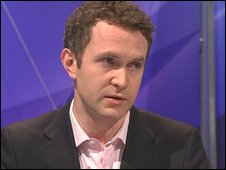|
 By Adam Branson By Adam Branson
It was never going to be a particularly focused discussion. The motion for debate – “Europe is failing its Muslims” – and the panellists chosen made this week’s British Council and Intelligence Squared event inevitably rancorous.
The panellists were such that the phrase ‘shared consensus’ had necessarily been left in the cloakroom. Pro the motion were Tariq Ramadan, professor of contemporary studies at Oxford University, and Petra Stienen, a former Dutch diplomat with much experience in the Arab world. Against the motion were Douglas Murray, well known in British media and political circles as the director of the Centre for Social Cohesion and an arch controversialist, and Flemming Rose, the opinion and culture editor on the Danish paper Jyllands-Posten and the man who commissioned the notorious cartoons of the Prophet Muhammad. The event was set for acrimony.
But more importantly, the motion up for debate was inherently flawed. To implicitly state that European Muslims are some sort of homogenous group of like-minded individuals, or that European policy towards Muslims is uniform, is bare-face, head-whacking-against-the-proverbial-brick-wall wrong. The result was that for much of the debate, panellists and audience members alike rejoiced in accusations that “you’re talking about Muslims as if they’re all the same”, or, conversely, that “you’re acting as if all Europeans are all the same”. Not particularly useful.
The debate was entertaining, for sure. But for me the purpose of debate is not simply the airing in public of personal prejudices, but to reach some form of Hegelian resolution: thesis, antithesis, synthesis. That was simply not on the cards here. As Ramadan and Murray agreed at one point, they meet pretty much once a year in some public arena in order to have the same argument. Again I ask: is that helpful? It is, of course, possible that Ramadan and Murray have made steps over the years to meet each other half way, but if that’s the case then those steps must have been incremental at best.
The stars of the show – and referring to the debate in the language of show business is entirely appropriate in this case – were undoubtedly Ramadan and Murray; again a shame as Stienen and Rose are reasoned and serious people whose arguments deserved to be heard. Tariq Ramadan was his usual urbane, eloquent self and, despite the earnest conviction of his delivery, avoided provocation. In lucid terms he argued that Muslims had made and continued to make a huge contribution to European society. He is, he said, European, British and a Muslim – and what of it? Quite so.
Murray was a different beast. The man is incapable of contributing to any debate involving Islam and the West without saying something provocative – 9/11, 7/7, the Madrid bombings; all present and correct as examples of why Islam is the ‘problem’ when it comes to social cohesion in modern day Europe. But you might as well blame a wolf for snarling – provoking cat-calls and cries of ‘shame’ is Murray’s bag. It’s his thing, his mojo. He basks in the glory of an audience’s opprobrium, a contented smirk etched across his face. This is a man who couldn’t care less about being hated, a characteristic that might be admirable if it wasn’t also so unnecessary. It is perfectly possible to raise issues such as Muslim communities’ attitudes towards women, homosexuals or patriotism – as indeed Rose did – without creating such a stink.
The obvious question, therefore, is why on earth such a consensus-seeking body as the British Council would ask Murray to take part. Naively, I had thought before the event that asking Rose to contribute was the greatest provocation. After all, he was the reason for the heavy police presence outside the venue and the compulsory bag search on the way in. But in fact Rose was reasonable and was listened to with respect. Murray has based – and made – his career on his willingness to really piss people off and can be relied on to perform to type. I can only suppose that the reasoning was that Murray’s histrionics were bound to attract publicity.
In fairness, I don’t direct my criticism of the motion for debate, nor the chosen speakers, towards the British Council per se. For engaging with such subject matter the British Council should be praised – hosting this debate at all was pretty bold. Given the fact that the BBC was recording the event and that it will be broadcast around the world, the British Council’s willingness to grant an audience to folk like Murray and Rose is a brave step for an organisation that makes cultural relations a major priority. It’s just a shame that the motion for debate wasn’t more coherent. I would modestly suggest that a motion along the lines of “Radical Islam is the greatest current threat to Europe” or “Europe has benefited hugely from the influence of Islam” would have at least had the advantage of focusing matters.
What’s truly fascinating is that Murray and Rose won out in the end. The audience, having initially backed the motion and spent so much time energetically laying into Murray and Rose, in the end opposed the motion and supported the evening’s supposed hate figures. Quite what they thought they were voting ‘yes’ or ‘no’ for exactly wasn’t clear. The motion, already confused, was lost entirely at some indeterminate point in the evening; I for one considered the voting slip in my hand and thought better of it. If the audience’s vocal reaction had been the final adjudicator the result would have been different, but at the end of the day the silent majority won through. Whatever that means.
Adam Branson is features editor for Regeneration and Renewal magazine
|



